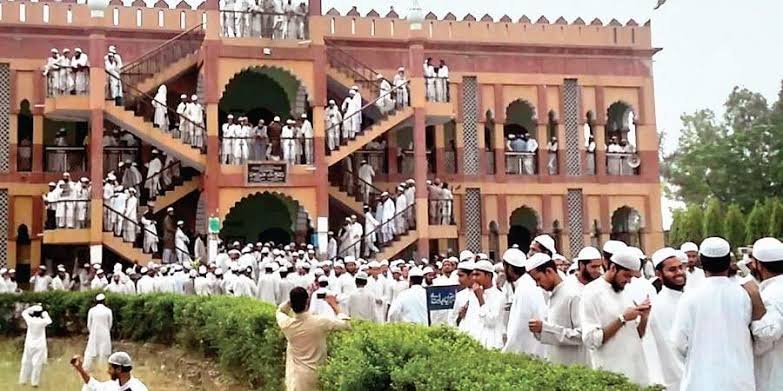Why Deoband is silent on ban on women’s education?


One of the most significant and influential centres for Islamic studies, particularly in South Asia, Darul Uloom, Deoband, does not appear to have the time to discuss women’s education. In email correspondence with Darul Uloom and the online fatwa platform, I sent several requests to them. However, despite being pursued for months, the seminary did not even attempt to answer.
After the Taliban forbade women from attending school in Afghanistan in November 2022, I first made the request to the online fatwa division of Darul Uloom called Darul Ifta. It was asked to be made clear whether women’s education is permitted by sharia and whether the Taliban’s prohibition on it in Afghanistan is in line with Islamic principles. But despite several attempts to reach Darul Uloom, the Islamic centre remained silent.
It should be mentioned that Muslim scholars established Darul Uloom, Deoband in 1866 in a little hamlet around 100 miles north of Delhi. It has grown to be one of South Asia’s most esteemed Sunni Islamic institutions. The Taliban are adherents of Deobandi Islam, which is the system of thought that the institute represents.
Many eminent academics from this institution relocated to Pakistan when India was partitioned and established seminaries, or madrassas, where they taught a strict interpretation of Islam, especially along the Pakistan-Afghanistan border. And the majority of the Taliban’s leadership received their education there. Thus, the Taliban likewise adheres to Deobandi’s philosophy. By this philosophy and interpretation of Islam, the Taliban defend their clerical rule and their aspirations for a strict Islamic regime. Due to their shared ideologies, Darul Uloom may be hesitant to state their position on the Taliban’s decision to forbid women from attending school.
Modern-day Pakistan and Afghanistan have sizable Deobandi populations. Deobandis in Pakistan and Afghanistan frequently assert that they don’t interact much with the original Deoband school in northern India. But the truth is that their madrasas adhere to Deoband’s course of study, which emphasises the most traditional views of Islamic law, theology, and philosophy. Also, several important positions in the present Taliban-led government are held by former students of Darul Uloom Haqqania, one of the most prestigious Deobandi schools in Pakistan’s northwest region of Khyber Pakhtunkhwa.
Even Mullah Omar, the Taliban movement’s founder, attended Darul Uloom Haqqania to further his education. Since it has produced more Taliban leaders than any other school, the institution is frequently referred to as the University of Jihad.
Hence, the assertion that Deobandis in the area have no relationships doesn’t appear credible. They might not have much of an organisational relationship, but they do have an ideological one. It is also true that Deobandi madrasas in the Afghan-Pakistan border regions have shuttered their schools and encouraged the students to join and support the Taliban whenever the Taliban needs a large number of foot troops.
The Taliban assert that Sharia law justifies their prohibition on women attending school. Sharia, however, is open to several interpretations among various schools of Islamic law, hence there is no single understanding of it. The Deobandi movement, which adheres to the Sunni Hanafi school of law, serves as the foundation for the Taliban’s hard-line Islamic ideology. Sharia in this country is distinct from Sharia in other mainly Muslim nations, especially other mainly Sunni nations. Many times in the past, the Darul-Uloom in Deoband has come under fire for issuing fatwas that forbade Muslim women from working outside the home or having girls pursue contemporary education. Deobandis in Pakistan and India, however, lack the authority to forbid women from attending school.
As a result, they simply express their opinions and, occasionally, issue fatwas. Yet in Afghanistan, where the Deobandis control the government, they are free to impose whichever interpretation of Sharia they see fit. And by remaining silent on this contentious topic, other Deobandis throughout the subcontinent are providing them with ideological support.
The Deobandis assert that they adhere to the original and purest version of Islam, yet in reality, the Muslim Ummah as a whole does not share their beliefs and teachings. Ironically, the Deobandis frequently express their opinions or even issue fatwas on topics like kite flying, photography, Muslim clothing codes, and beards for men. If these fatwas were merely opinions, it would not be very important. Yet, they are viewed and projected more as edicts, directives, and defining statements about what should and should not be believed. Strangely, Darul Uloom does not feel that it is vital to express its opinion on the Taliban’s recent restriction on women’s education.
DISCLAIMER: The author is solely responsible for the views expressed in this article. The author carries the responsibility for citing and/or licensing of images utilized within the text.
